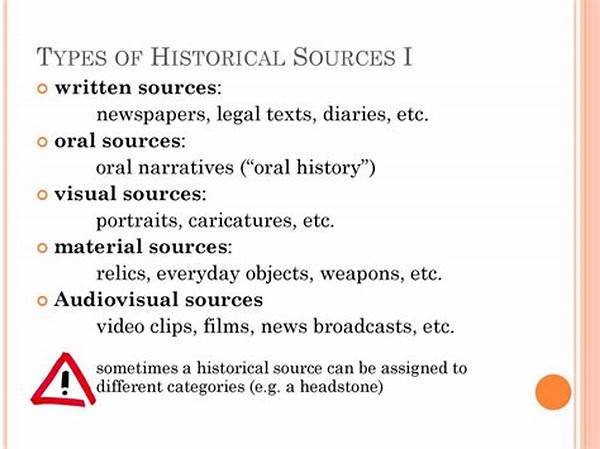In the realm of historical research, the truth often resides not just in dusty tomes and aging documents but in the vibrant sounds and sights of the past. Have you ever wondered how the mesmerizing power of film or an old radio broadcast can breathe new life into long-forgotten events? Picture this: you’re sitting in a dimly lit room, a history documentary rolls on the screen, and suddenly, with a flicker, you are transported to a time when giants walked. This is the magic of audiovisual sources in historical research. It’s not just history; it’s living history. Cue the goosebumps!
Read More : Latest Audiovisual Technology For Collaborative Workspaces 2025
But hey, who wouldn’t want to dive into the past when it’s presented like your favorite Netflix series? Audiovisual sources are becoming the unsung heroes in historical research, providing a dynamic and engaging way to support truth-finding missions. They’re like the adrenaline shot that every dry historical account urgently needs. Imagine being not just a reader but an eyewitness, experiencing history as if your favorite vlogger decided to take a field trip to the Middle Ages. So, buckle up your seatbelts because we’re about to embark on a captivating journey of exploring the benefits of audiovisual sources in historical research supporting truth finding.
The Evolution of Historical Research
As historians seek to uncover truths buried in the sands of time, the traditional archives and libraries have found a formidable companion in audiovisual sources. Audiovisual materials serve not merely as supplements but are becoming crucial in reconstructing histories with accuracy. From war footages capturing life in the trenches to personal interviews of historical figures, these sources offer direct gateways to the past. By bridging the gap between contemporary narratives and historical events, they provide insights and perspectives that written documents alone may miss.
Imagine the wealth of information hidden within a simple newsreel from the Great Depression or a crackly radio broadcast on the eve of World War II. These are not just recordings but testimonies of an era, crystallized forever for today’s historians to decode. This holistic approach marks a shift towards a more inclusive and accurate understanding of history, ensuring that future generations inherit the truth, unblemished and raw.
Advantages of Audiovisual Materials in Uncovering Truths
Enhanced Engagement
One of the main benefits of audiovisual sources in historical research supporting truth finding is their ability to captivate and engage. The vivid representation of events, through images and sounds, creates a more memorable learning experience compared to text-based resources.
Multi-dimensional Perspectives
Audiovisual records provide a multi-dimensional perspective that can address various interpretations of historical events. This enriches the analysis process, allowing researchers to consider contrasting viewpoints and draw more nuanced conclusions.
Emotional Impact
Humans connect deeply with stories, especially when they are portrayed visually and auditorily. Emotions awaken authenticity and empathy in the viewer’s heart, making the past feel more immediate and relevant. Utilizing audiovisual materials taps into these emotional depths, offering a profound connection to historical narratives.
Detail and Purpose in Audiovisual Resources
The meticulous detail captured in audiovisual sources surpasses many traditional records. These resources document facial expressions, tones of voices, and ambient sounds, offering a comprehensive context often omitted in text.
- Facial Expressions and Body Language: Non-verbal cues provide clues that deepen the understanding of historical figures and their motives.
- Voice Tonality: A speech without text can reveal passion, irony, or melancholy, painting a complete emotional picture of the speaker.
- Depiction of Daily Life: Some simple home videos or community recordings can serve as invaluable resources, showcasing life beyond landmark events.
The purpose of these materials parallels that of traditional documents: to inform, to question, and indeed, to challenge prevailing narratives. But where they truly shine is in their ability to tell stories with authenticity, drawing the audience into a shared experience with the past.
Insightful Storytelling: Benefits Explored
Using audiovisual sources is akin to unlocking a treasure trove of rich storytelling that transforms historical research. These materials allow for a more inclusive narrative, piecing together fact with human experience.
Read More : Solution When Sound And Picture Are Not Synchronized In Av System
The Promise of Authenticity
Authenticity is at the core of the benefits of audiovisual sources in historical research supporting truth finding. They allow historians to retrieve “voices” from the past and offer a chorus of testimonies that written records alone cannot provide.
Validating Written Records
Audiovisual sources can act as a tool to validate or contest written records. This cross-referencing builds a solid foundation for truth discovery, reducing the risks of bias or oversight in historical publications.
Diversity of Narratives
Incorporating audiovisual elements balances the scales of representation. By showcasing stories from different strata of society, these sources provide a comprehensive view that brings forth diversity in narrative and experience.
Summing Up the Audiovisual Advantage
A Bright Future with Audiovisual Sources
With the growing digital archives and technological advancements, the future looks promising for those keen on using audiovisual resources in historical inquiry. They have become indispensable for not just scholars but anyone with a thirst for knowledge about our shared past.
Bridging Generations
By integrating audiovisual materials into historical research, we are bridging the generational gaps, making history accessible, invigorating, and most importantly, truthful.
In conclusion, the benefits of audiovisual sources in historical research supporting truth finding are manifold and immensely powerful. By presenting an enriched, multi-faceted view of history, these sources ensure narratives are complex, engaging, and rooted in authenticity. The audiovisual tide is rising, and it promises to unveil the hidden truths with vibrancy and clarity that mere words might not encapsulate. So, let us embrace this mixture of sight, sound, and storytelling, for the truth, after all, deserves to be seen as well as heard.
